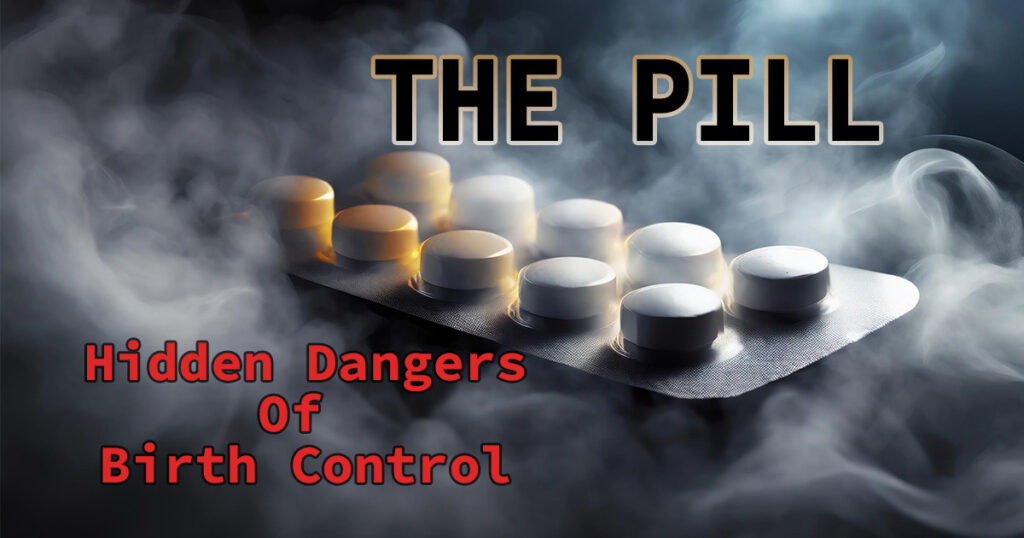The Hidden Dangers of Birth Control Pills

A lot of women have innocently taken birth control pills for several reasons, from avoiding unwanted pregnancies to regulating their menstrual cycle or controlling acne. Whatever the reason, millions of women have unknowingly caused harm to their bodies by taking birth control pills.
The Dark Side of Birth Control Pills
Hormonal birth control methods such as “the Pill” have a dark side. Even the manufacturers themselves list some of the ingredients as carcinogens (causes of cancer). Moreover, birth control pills operate by releasing hormones that prevent ovulation, a key phase in the female menstrual cycle where an egg is released from the ovaries, usually about 14 days before menstruation begins. By interrupting this natural process, the use of birth control pills can lead to a variety of side effects, which I shall reveal in this article. However, before we continue our discussion, let’s go over a few key terms you’ll need to know:
- Progesterone – is the primary pro-gestational steroid hormone secreted by the female reproductive system. It is linked to the menstrual cycle, pregnancy, and embryo development. Progestin is an artificial form of progesterone used for medical purposes.
- Progestin – a natural or synthetic steroid hormone, such as progesterone, that maintains pregnancy and prevents further ovulation during pregnancy.
- Pro-gestational – the period preceding pregnancy or gestation.
- Estrogen – a hormone that plays a role in both the male and female reproductive systems. It contributes to reproductive and breast health in females, among other functions.
- Aura – seeing flashing zigzag lines
- Slynd (drospirenone) – an estrogen-free birth control pill. It only has the hormone Drospirenone, which is a progestin. Slynd is also a hormonal contraception with a 24-hour missed pill window.
Short-term Side Effects of Birth Control Pills
Birth control pills contain artificial progesterone or estrogen and progesterone. They affect the hormone levels in a person’s body, which may cause some women to experience side effects shortly after taking them. Short-term side effects include:
- Headaches
- Bleeding between periods or spotting
- Nausea and vomiting
- Breast tenderness
- Weight gain
- Depression and mood swings
Long-term Side Effects of Birth Control Pills
Unfortunately, for many women who have taken or are currently taking the pill, the patient information pamphlets for hormonal birth control methods list an extensive range of long-term side effects that include:
- Changes in menstrual pattern, for example, PMS and dysmenorrhea
- Abdominal discomfort, bloating, and pain
- Long-term hormonal regulation problems
- Loss of libido
- Fatigue
- Significant weight gain
- Hair loss
- Fluid accumulation
- Acne and rashes
- Early unintended abortion
- Ectopic pregnancies
- Breast pain and swelling
- Dizziness and fainting
- High blood pressure
- Elevated potassium levels
- Yellowing of the eyes and or skin
- Fatal blood clots
- Heart attacks
- Stroke
- Cancers
- Anaphylaxis
- Sudden total or partial blindness
- Pulmonary embolisms
- Gallbladder problems, including gallstones
- Inflammation of the pancreas
- Insulin sensitivity
It is essential to know that all of the short-term side effects can also be long-term side effects. Another interesting fact is that those who have taken birth control pills are no longer able to make Vitamin B-1 or thiamine; therefore, they must take thiamine supplements every day.
Of all the known side effects caused by the hormonal pill, deep vein thrombosis is recognized as being one of the most serious. Deep vein thrombosis is a blood clot that can be potentially fatal. Some versions of the pill can increase the risk up to eight-fold.
Journal of Pharmacology and Pharmaco-therapeutics.
Other symptoms that are considered to be extremely serious include:
Sexual dysfunction – it can be challenging to regulate a woman’s testosterone levels when she has been on the pill. Research has found that women can have low amounts of testosterone even when they are no longer on the pills.
Women’s bodies use testosterone in the same way men’s bodies use them to regulate sexual function, but in lower amounts. According to research conducted by the Royal Society B: Biological Science, participants who used hormonal contraceptives while choosing their partners were less attracted to them and less sexually satisfied during their relationship than were individuals who did not use hormonal contraceptives.
Cancer – The use of oral contraceptives increases the risk of breast and cervical cancers in women, according to the National Cancer Institute. Teenage girls are especially vulnerable to breast cancer because their breasts are still growing.
Psychological Effects – Birth control pills interfere with a woman’s mood and libido, and they very often end up on Prozac. Some research also faults the hormones in pills for some women’s poor choice of men.
Smoking and Birth Control Pills
In addition to the risks associated with birth control pills, smoking exacerbates their harmful effects.
Smoking and birth control pills are not a match made in heaven. Women who smoke are advised not to use any contraceptive that has the hormone estrogen in it because that combination makes women more susceptible to complications such as heart attack or stroke.
Combinations Pills
Women are advised to avoid using combination pills if they have the following health issues:
- Blood clots, inherited blood-clotting disorder, or vein inflammation
- Breast cancer
- Heart attack, stroke, angina, or any other serious heart problem
- Migraine headache with aura
- Uncontrolled high blood pressure
- Uncontrolled diabetes
- Liver disease
Progestin-only Pills
Progestin-only birth control pills contain only one hormone. Women suffering from certain forms of lupus and breast cancer are advised to avoid using them.
According to Planned Parenthood, women suffering from certain types of lupus should avoid progestin-only pills. At the same time, another research suggests that progestin-only pills are the only safe form of birth control pills for this population. As we can see, having varying opinions on a subject is not uncommon. While this may cause confusion, it is a fact that when lupus is active, women suffering from this disease are more prone to potentially dangerous blood clots, such as deep vein thrombosis and pulmonary embolism. So, if you have lupus and are considering taking birth control pills, or if you are currently taking one and have some concerns, it is totally worth it to do some additional research.
Slynd (a type of progestin-only pill)
Women with cervical, breast, ovarian, uterine, and or endometrial cancer are to avoid using the 24-hour missed pill, Slynd.
Women with the following medical conditions are advised against taking the 24-hour missed pill due to increased risk of heart disease and other health problems.
- Kidney disease
- Adrenal insufficiency
- Liver disease
Birth Control Pills Are an Environmental Toxin
Birth control pills are not only harmful to the women taking them, but they are also harmful to the environment. Much of the female hormonal content in the pill and other birth control methods is excreted via urine. The main ingredient in birth control pills, synthetic estrogen, can contaminate the natural waterways and alter fish reproductive system. Consequently, scientists are finding increased “intersex” animals in aquatic environments that could collapse fish and other marine populations.
Conclusion
Although we have been deceived (in my opinion) to believe that the pill is safe, any intervention in the body’s natural processes will have some side effects. Not only is “The Pill” dangerous to the women who take it, but the medication is also dangerous to the environment and other humans. Therefore, if you are currently on the pill or you are considering taking the pill, it is worth it to do some additional research to determine if it is truly right for you.
I hope this article has given you a better understanding of the impacts that “The Pill” can have on the body, the environment, and those you love. Please share the article with someone you feel may be blessed by it. Until next time, take care, happy healing, and see you soon.
